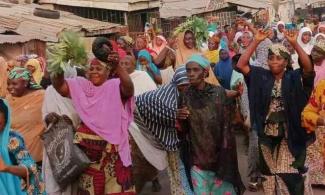
Market women and men who protested in the streets of Lokoja, the state capital, lamented the ever increasing prices of essential commodities and how it has affected patronage of their businesses.
Nigerians in more states are embracing the mass protest against the President Bola Tinubu-inflicted harsh economy as traders in Kogi State on Wednesday staged a massive protest over the high costs of food items.
Market women and men who protested in the streets of Lokoja, the state capital, lamented the ever increasing prices of essential commodities and how it has affected patronage of their businesses.
SaharaReporters earlier reported that there was a fresh round of protests in Suleja, the commercial nerve centre of Niger State which is only a few kilometres away to the Federal Capital Territory, Abuja.
The angry Nigerians had stormed the streets on Wednesday, according to photographs obtained by SaharaReporters, calling on the President Bola Tinubu-led government to end the hardship and unbearable inflation they were suffering.
According to Daily Post, in Lokoja, the traders closed their shops as they no longer got patronage due to the high cost of commodities.
During the protest, a trader who was simply identified as Mrs Ladi, who deals in rice and beans, said the astronomical increase in the cost of the commodities had affected her business capital as she has continued to record low sales.
Mrs. Ladi, who lamented that she could hardly make profit after trading was quoted as saying that “Mudu of rice which was selling for N800 now cost N1,700. This is because a bag of rice which cost N35,000 has now increased to N65,000. With this, we cannot make our own profit.”
She said that “This is the reason we are calling on the government to come to our aid by subsidising commodities grown in Nigeria. We are tired of low sales.”
Another trader lamented that despite efforts by traders to part with some profits on goods, poor patronage has become discouraging.
The trader said that “There is nothing to show for our efforts in terms of expected gains or profit. We are only praying that our labour should not be in vain at the close of trading activities.”
Also, another protester, Mrs Laruba, who sells palm oil, lamented that she usually travels to Kogi East to purchase the commodity. But she expressed regrets that the business is no longer profitable.
Laruba added that by the time she calculated her expenses and subtracted the same from the cost of the items, buyers often felt cheated.
For Mrs Adah, a vegetable trader, the Nigerian Government should address the astronomical increase in the cost of food items.
Adah said that “Prices of pepper, rice, beans among others have all gone up and the hike in price cuts across every item. To worsen the situation, the government is not helping matters.
“We are pleading with the government to assist us with a view to ensuring the reduction in the price of food items. We are only managing to eat. The hike in the price of commodities has almost eroded our profit.”